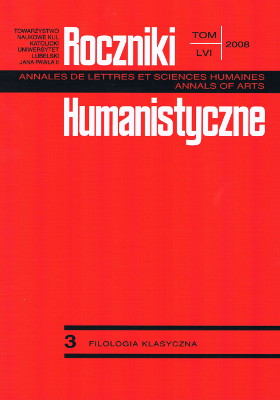Notes on Euripides’ Medea
Abstract
This paper attempts to characterise the heroine of the Euripides’ play through her murderous plan and scenic presence. Medea organizes every stage action and spreads out the emotional control of secondary characters and scenic events with her strong and almost manly personality. The meaningful feature to observe is that she does not leave the scene since her first entrance till the exit in order to kill the children, so she can be in the centre and be the centre of the scenic situation in the major part of the spectacle.
In the first part of the paper we observe, with a special attention paid to what elements of her personality help her to reach what she wants, how Medea creates her revenge plan in details and in the full view of the spectators. Step by step she builds up its points: she wins one day longer in Corinth, gets from Aigeus an asylum in Athens (this episode is the subject matter of the second part of the paper), persuades Jason to let the children give her gifts to the princess. The final point is to kill her sons.
The last passage focuses on the effect of Medea’s two entrances, both significant from a theatrical and a dramatic point of view. The first entrance brings her continuous presence and her control of the whole action to the stage. The other one, at the end of the play—followed by the spectacular escape in the Helios’ chariot, with her godlike appearance when she establishes the institution of the worship and prophesies the future events—shows that her control influences not only what is present but also what is future.
All that depicts Medea as a central character in the play, focusing the emotional tension and the scenic effect on herself, manipulating to a large extent stage events and directing their development into the final realization of her intentions.
References
Appleton R. B.: Euripides the Idealist, New York 1972.
Arystoteles: Poetyka, przeł., wstępem i komentarzem opatrzył H. Podbielski, Wrocław 1983.
Axer J. : Teksty tragików greckich jako scenariusze, [w:] Literatura Grecji starożytnej, t. 1: Liryka – epika – dramat, red. H. Podbielski, Lublin 2005, s. 647-668.
Buttrey T. V.: Accident And Design in Euripides’ Medee, „American Journal of Philology” 79 (1958), s.1-17.
Chodkowski R. R.: Ajschylos i jego tragedie, Lublin 1994.
Chodkowski R. R.: Teatr grecki, Lublin 2003.
Collinge N. E.: Medea ex machina, „Classical Philology” 57 (1962), s. 170-2.
Cunningham M. P.: MEDEA ΑΠΟ ΜΗΧΑΝΗΣ, „Classical Philology” 49 (1954), s. 151-60.
Fritz K. von: Antike und Moderne Tragödie, Berlin 1962.
Grube M. A.: The Drama of Euripides, London 1941.
Hourmouziades N. C.: Production and Imagination in Euripides, Athens 1965.
Kitto H. D. F.: Tragedia grecka. Studium literackie, przeł. J. Margański, Bydgoszcz 1997 (oryg.: Greek Tragedy. A Literary Study, New York 1954).
Knox B.: Word and Action. Essays on the Ancient Theatre, Baltimore–London 1979.
Lesky A.: Die Tragische Dichtung der Hellenen, Göttingen 1972.
Lucas D. W.: The Greek Tragic Poets, Boston 1952.
Mastronarde D. J.: Euripides, Medea, Cambridge 2002.
Page D. L.: Eurypides, Medea, Oxford 1938.
Rohdich H.: Die Euripideische Tragödie, Heidelberg 1968.
Sourvinou-Inwood Ch.: Medea at a Shifting Distance: Images and Euripidean Tragedy, [w:] Medea: Essays on Medea in Myth, Literature, Philosophy and Art, ed. J. J. Clauss, S. J. Johnston, New Jersey 1997.
Walcot P.: Greek Drama in Its Theatrical and Social Context, Cardiff 1976.
Webster T. B. L.: Greek Theatre Production, London 1956.
Webster T. B. L.: The Tragedies of Euripides, London 1967.
Wilamowitz-Moellendorff U. von: Griechische Tragoedien, t. III, Berlin 1926.
Copyright (c) 2008 Roczniki Humanistyczne

This work is licensed under a Creative Commons Attribution-NonCommercial-NoDerivatives 4.0 International License.





